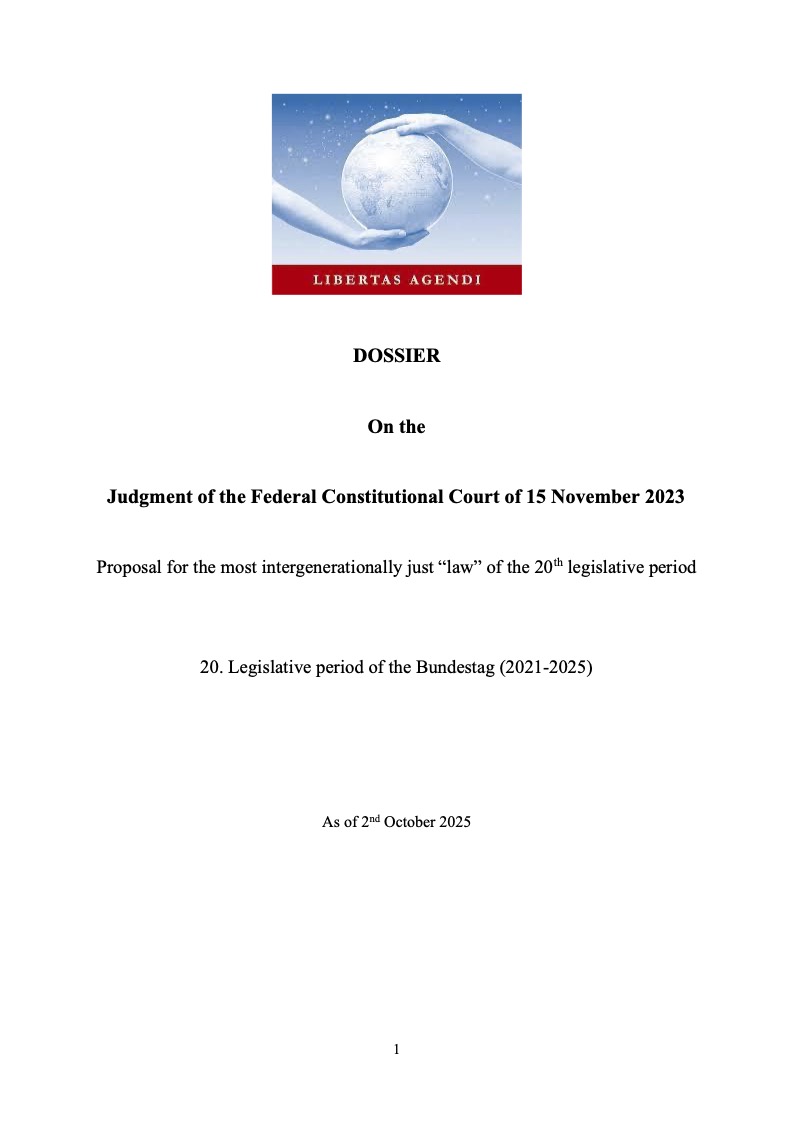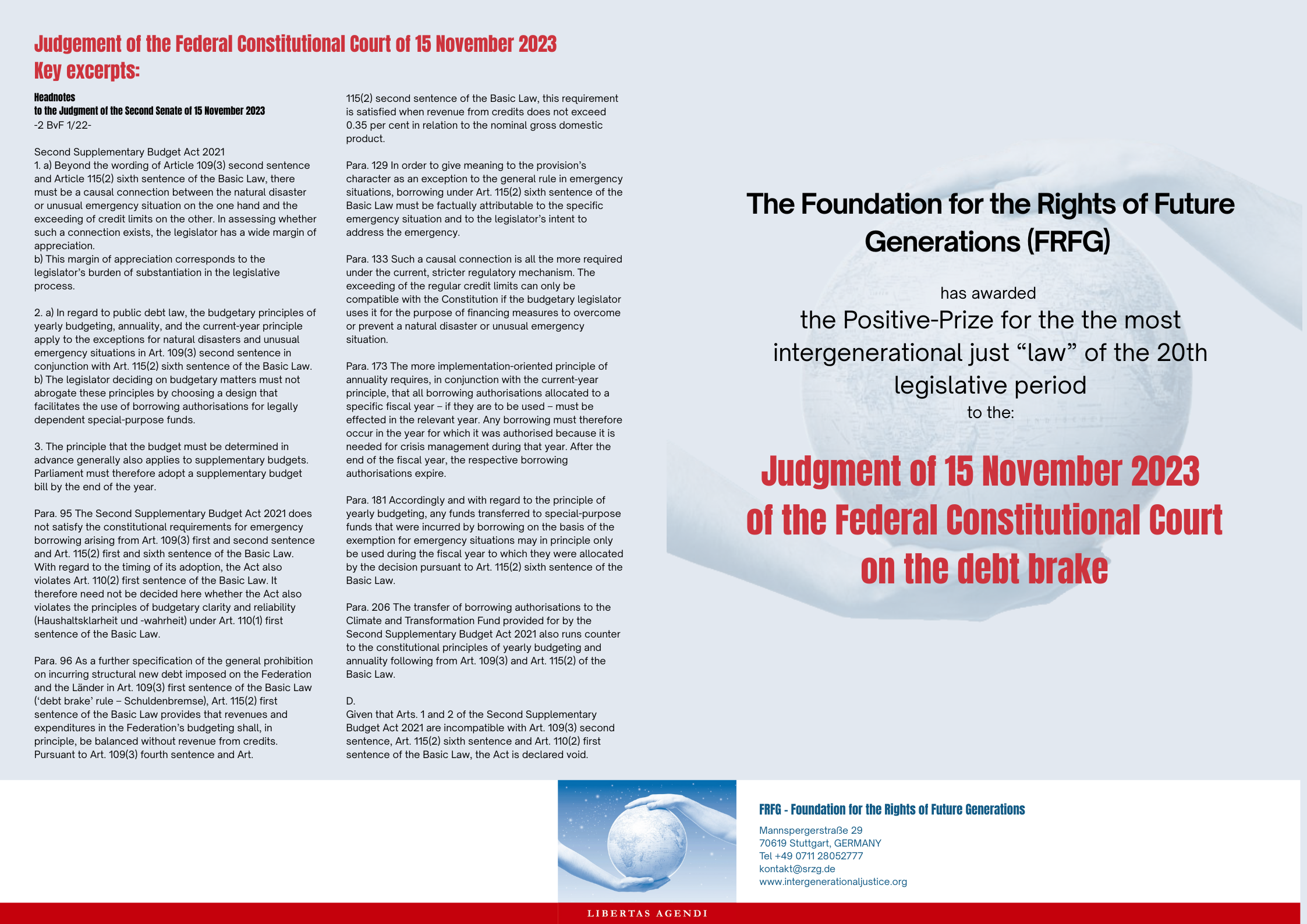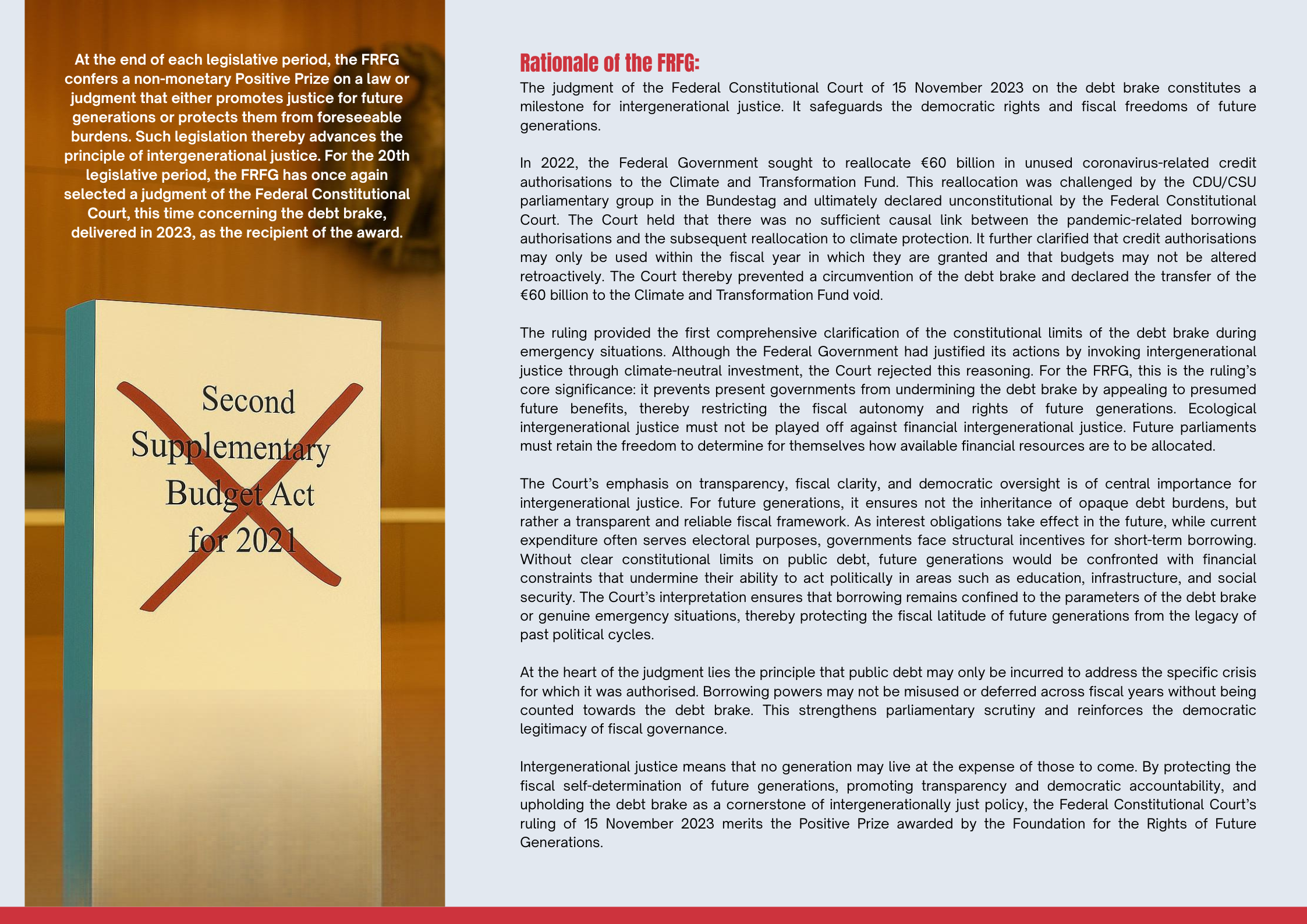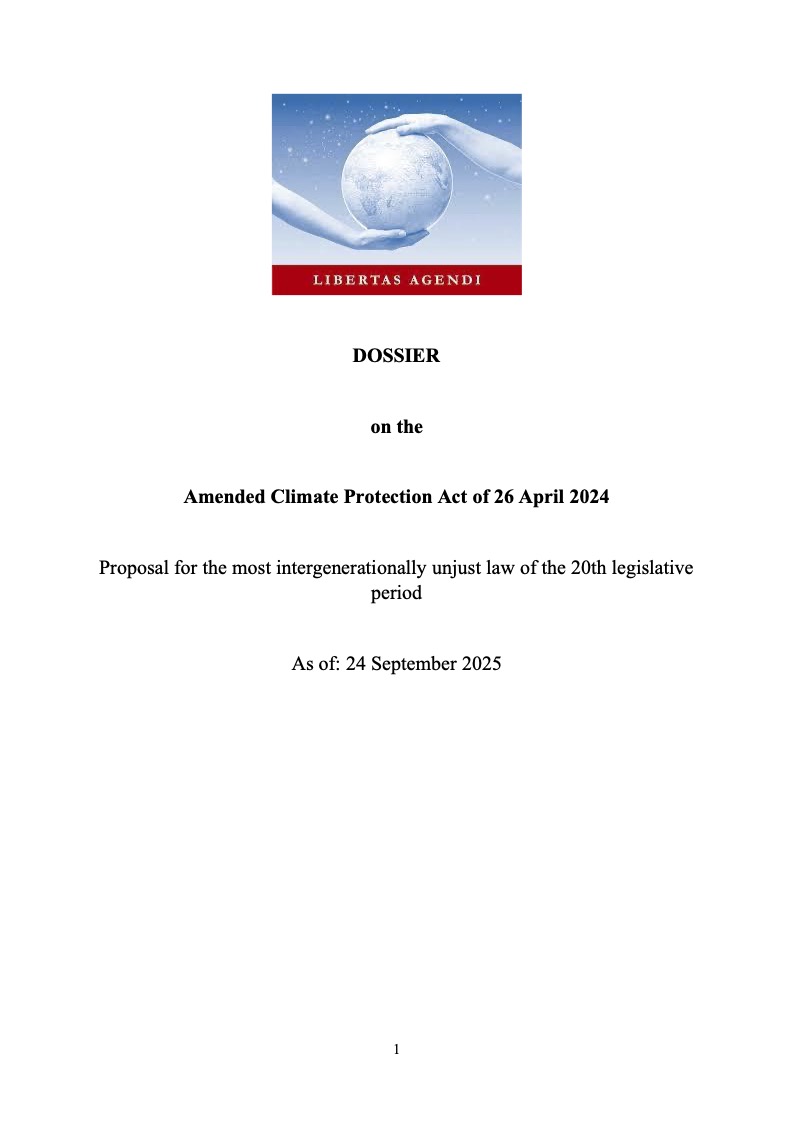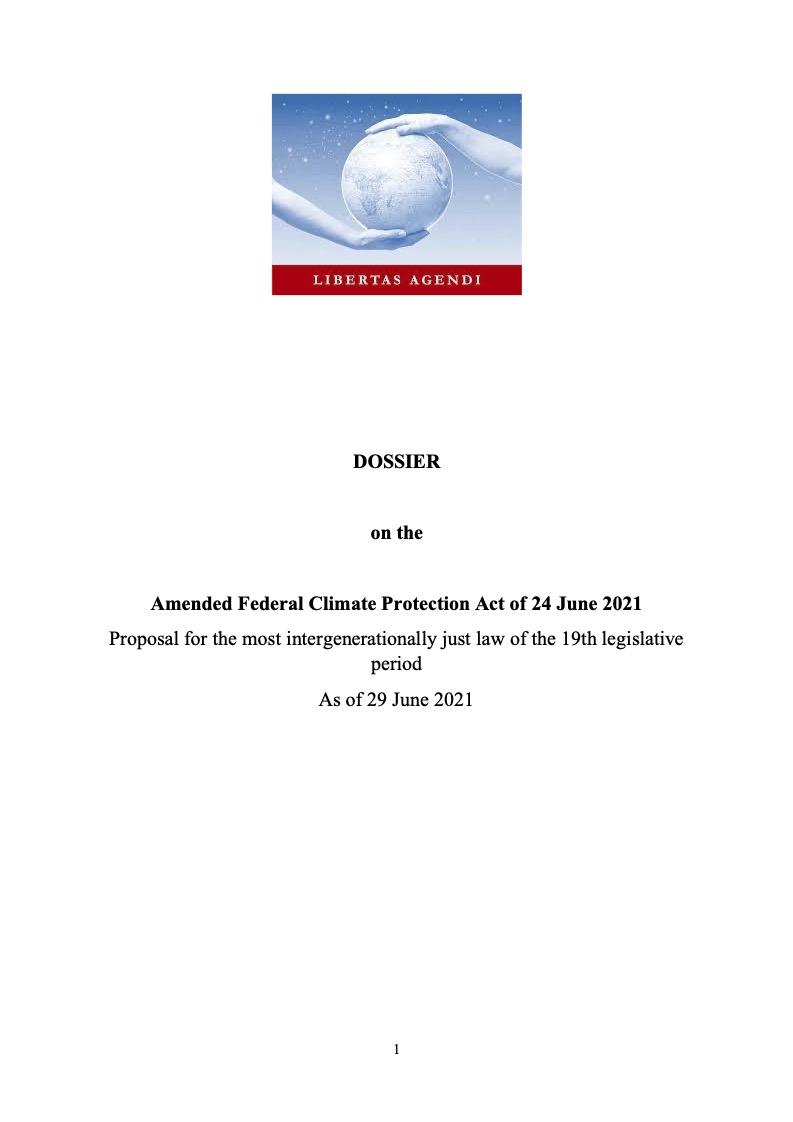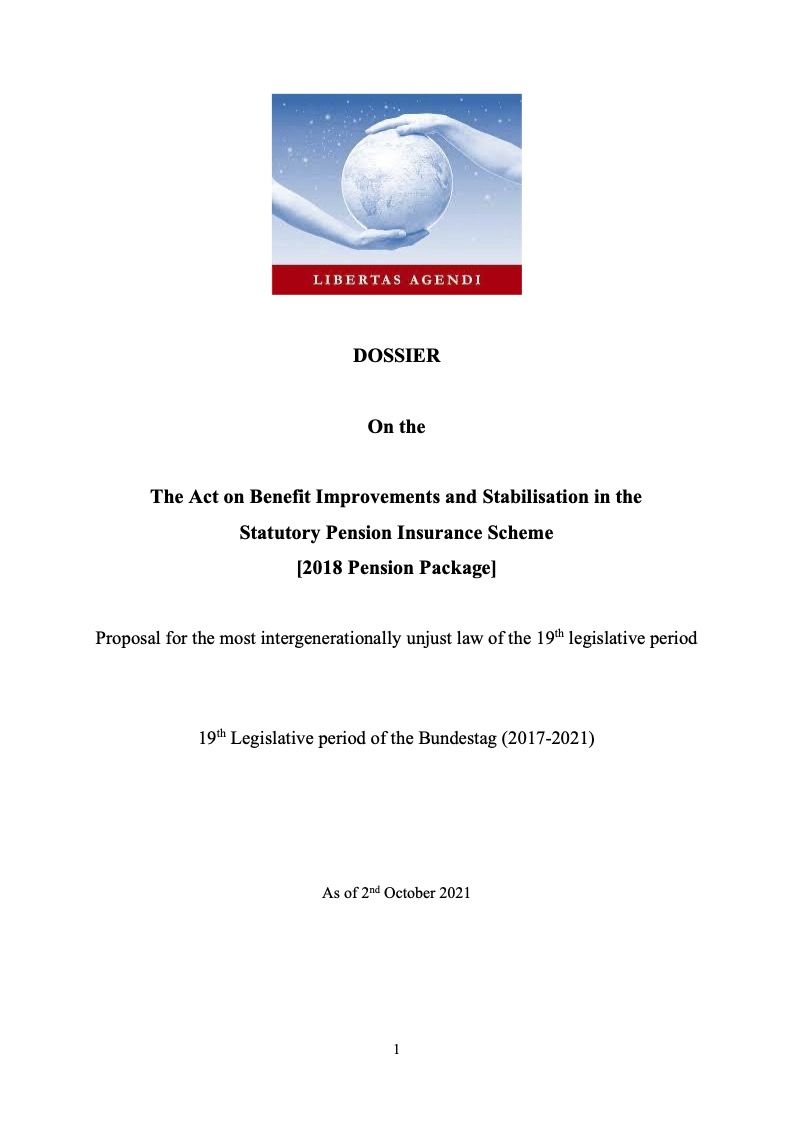FRFG’s Policy Award for Intergenerationally Just Laws
Description of the Prize
At the end of every legislative period in Germany, the FRFG will award an unremunerated prize for a law or legislative initiative which either removes a present injustice that affects future generations or protects future generations from future injustices. The law should be mainly based on the principle of intergenerational justice. The acting recipients of the legislative prize could be politicians who are either members of a government (national governments, EU-Commission), members of a parliament (Members of the European Parliament or UK MPs), or incumbents of a political office (secretary general, board member, leader of youth organization etc.).
The prize was awarded for the first time in 2013 and since then every four years after the federal election. With this award, the FRFG emphasises the importance of intergenerationally just laws and further encourages the newly elected members of the Bundestag to continue this positive development. Since 2017, the FRFG has awarded an additional negative prize for the most intergenerationally unjust law.
Evaluation and selection process
Due to its daily work, the FRFG has a good overview of laws and legislative initiatives being intergenerational just. In order to determine if a law has a positive influence on intergenerational justice, a catalogue of criteria was elaborated (impact of the law, contribution to intergenerational justice, intergenerational justice as justification, level of innovation, participation of young people, temporal continuance, etc.). The selection process is done in cooperation with a jury. In 2014 and 2018, the jury consisted of experts in both the theory and the practice, as well as members of the Scientific Advisory Board of the FRFG and FRFG board members.
The FRFG Policy Award winners so far
2021-2025
For the 20th legislative period of the Bundestag we have selected the following legislation:
Most intergenerationally just law:
The FRFG has once again selected a ruling by the Federal Constitutional Court as the most generationally just ‘law’ of the "Ampel" coalition government's legislative period. The award went to the ruling on the Second Supplementary Budget Act 2021, which was declared null and void by the court. The judges in Karlsruhe made it clear that budget funds cannot be shifted arbitrarily between fiscal years – especially not in circumvention of the debt brake. The ruling strengthens fiscal responsibility towards future generations and calls for greater budgetary clarity and sustainability.
Most intergenerationally unjust law:
The FRFG awards the negative prize for the last legislative period to the amendment to the Climate Protection Act passed in 2024. The reform weakened the binding CO₂ reduction targets for individual sectors and instead introduced an overall assessment – even if individual areas such as transport or buildings consistently fail to meet their climate targets. This weakens the binding nature of climate policy measures and pushes urgently needed emission reductions further into the future – at the expense of future generations.
Positive-Prize: Most intergenerationally just law
Content
In its judgment of 15 November 2023, the Federal Constitutional Court declared the Second Supplementary Budget Act for 2021 unconstitutional and therefore void. As a result, the Federal Government lost access to €60 billion, which it had originally intended to reallocate from credit authorisations granted to address the coronavirus pandemic to the Climate and Transformation Fund. With this decision, the Federal Constitutional Court rejected the Federal Government’s attempt to circumvent the debt brake through budgetary manoeuvring.
The proceedings were initiated by a constitutional complaint filed by the CDU/CSU parliamentary group in the Bundestag against the Second Supplementary Budget Act for 2021. The Federal Constitutional Court found that the Act violated the Basic Law in three respects. First, there was no causal connection between the emergency situation caused by the COVID-19 pandemic and the reallocation of loans to the Climate and Transformation Fund; the Federal Government failed to demonstrate how this redirection would contribute to combating the pandemic. Secondly, the reallocation contravened the budgetary principles of annuality and yearly budgeting, according to which credit authorisations must be used within the fiscal year in which they are approved. Finally, the adoption of a supplementary budget for 2021 in the year 2022 violated the principle that the budget must be determined in advance.
The Federal Constitutional Court made it unequivocally clear that public funds may not be transferred arbitrarily between budget years – particularly not in order to evade the constitutional debt brake.
Evaluation of the Law
The FRFG justified the awarding of its Positive Prize to the Federal Constitutional Court’s judgment of 15 November 2023 as follows:
The ruling provided the first authoritative clarification of how the debt brake, enshrined in the Basic Law, applies in situations of emergency. In its defence, the Federal Government had invoked the principle of intergenerational justice, arguing that reallocating unused pandemic-related loans towards climate-neutral investments would benefit future generations. The Federal Constitutional Court rejected this reasoning. For the FRFG, this aspect is of particular importance: the judgment prevents current governments from invoking presumed future benefits to justify breaches of the debt brake, thereby safeguarding the fiscal autonomy of future generations. By upholding the debt brake, the Federal Constitutional Court has reaffirmed its role as guardian of the fiscal freedoms of future generations. In reinforcing the budgetary principles of annuality, yearly budgeting, and prior determination of expenditure, the Court calls for greater transparency, sustainability, and integrity in fiscal policy. Such transparency promotes sustainable budgetary practices and ensures that future generations are not burdened by concealed debt, thereby preserving their fiscal flexibility.
In conclusion, the ruling advances fiscal responsibility towards future generations, strengthens budgetary clarity and sustainability, and protects future generations from disproportionate financial burdens.
Negative-Prize: Most intergenerationally unjust law
Content
The second amendment to the Federal Climate Protection Act (FCPA) primarily aims to reform the law’s control and enforcement mechanism. Crucially, the climate targets set by the first amendment in 2021 remain unchanged: Germany is still committed to achieving emission neutrality by 2045. One significant change is the abolition of annual sectoral targets for individual federal ministries. These specific sector-based limits have been replaced by multi-year total emission allowances that span specific decades and are composed of aggregated sectoral contributions. Under the new system, immediate pressure to take action is only triggered if the government's projection data is deemed incompatible with these long-term climate targets and multi-year allowances. The control mechanism itself has also been reformed. The federal government is now only required to act if projection data indicates that the targets will be missed in two consecutive years for the relevant compliance period. Should this happen, the federal government must then present measures to meet the emission targets. The key difference is that while the first amendment placed the obligation to act on individual federal ministries, the second amendment introduces a collective obligation on the entire federal government if the climate targets are not met.
Evaluation of the Law
The FRFG justifies awarding the Negative-Prize for the second amendment to the Federal Climate Protection Act for the following reasons:
The second amendment to the Federal Climate Protection Act weakens key control mechanisms, fails to introduce more stringent reduction targets, abolishes sectoral targets and responsibilities, and shifts accountability further into the future. Failure to implement effective climate protection measures exacerbates the consequences of climate change, such as deterioration of human health, an increasingly hostile living environment, and increased financial burdens. It violates the principle of intergenerational justice because current generations can continue to emit CO2 without suffering drastically from the effects of climate change. The (in)actions of today’s generation will lead to future generations suffering from the worsening consequences of climate change and having the primary responsibility to combat climate change. Furthermore, they must also fear infringements on their human rights and civil liberties to achieve the necessary climate protection.
At a time when scientists are escalating their warnings, Germany is visibly watering down climate protection. The failure to invest in climate protection now will place a heavy burden on future generations, financially, medically, and in terms of their freedom.
2017-2021
For the 19th legislative period of the Bundestag we have selected the following legislation:
Most intergenerationally just law:
With its Legislative Prize, the FRFG reviews an entire legislative period to determine which law best, and which law least, upheld the principle of intergenerational justice. For the 19th legislative period of the German Bundestag (2017–2021), the Legislative Prize took an exceptional approach: for the first time, it was not awarded to a law, but rather to the landmark ruling of the Federal Constitutional Court (BVerfG) of 24 March 2021.
Most intergenerationally unjust law:
The prize for the most generationally unjust law of the 19th legislative period was awarded by the FRFG to the “Act on Benefit Improvements and Stabilisation in Statutory Pension Insurance,” adopted by the CDU/CSU and SPD parliamentary groups—better known as the 2018 Pensions Package. The Negative Prize was thus conferred upon the 2018 Pensions Package. A detailed description and evaluation of this law can be found in this dossier.
Positive-Prize: Most intergenerationally just law
Content
The landmark ruling stems from a constitutional complaint filed by nine young people regarding the inadequate measures contained in the first Federal Climate Protection Act (2019), which they consider insufficient to meet the 1.5°C target set out in the Paris Agreement. The Paris Agreement is an international treaty concluded by 195 parties at the UN Conference of the Parties (COP) under the regime of the United Nations Framework Convention on Climate Change (UNFCCC). The Paris Agreement aimed to promote global climate action as a successor to the Kyoto Protocol.
The Federal Constitutional Court found the Federal Climate Protection Act to be partially unconstitutional and insufficient to protect and guarantee the young and, in some cases, underage complainants’ civil rights and intertemporal liberties in the future.
The consequence was a readjustment of the Federal Climate Protection Act. The changes made are reflected in the amended Federal Climate Protection Act of 2021. The Federal Government has agreed on new climate protection goals: a 65% reduction in emissions by 2030 (+10%) and an 88% reduction by 2040 compared to 1990, as well as achieving climate neutrality by 2045 (-5 years).
Evaluation of the Law
The jury justified awarding the Positive-Prize for the ruling of the Federal Constitutional Court of March 24, 2021, as follows:
This groundbreaking ruling declares for the first time that a specific violation of the principle of intergenerational justice by the legislature is unconstitutional. It can be assumed that this pioneering judgement will change the appreciation of the role of intergenerational justice in politics and society.
The judges' strong orientation toward Article 20a of the Basic Law, which refers to the duty to protect future generations, is unique to date. The judgement can therefore be characterised as revolutionary, as it reinterprets the concept of freedom: the freedom of the generations living today is limited by the freedom of future generations.
Negative-Prize: Most intergenerationally unjust law
Content
The central component of the Pension Package is the amendment of the pension formula and the introduction of the so-called “double stop line” (doppelte Haltelinie). This mechanism guarantees that the pension level will not fall below 48 per cent, while the contribution rate will not rise above 20 per cent. The regulation is intended to apply until 2025.
Two elements of the law are of particular relevance: the suspension of the sustainability factor and the deactivation of the catch-up factor.
Evaluation of the Law
Germany’s statutory pension insurance system is founded on the generational contract, in which today’s and future employees represent one party, and current pensioners represent the other. The 2018 Pension Package effectively breaks this contract. By suspending the sustainability factor, it prevents a fair distribution of financial burdens between contributors and pension recipients.
The sustainability factor was introduced in 2005 to cushion the effects of demographic change and to ensure that the financial responsibility for pensions was shared between working and retired generations. This adjustment became necessary as the ratio between pensioners and contributors shifted. Younger people paid slightly higher contributions, while older people received somewhat smaller pension increases. In this way, no generation was unfairly favoured or disadvantaged. The Pension Package of 2018, however, dismantled this balance by neutralising the sustainability factor.
Another key element of the generational contract that benefited younger generations before the adoption of the Pension Package was the catch-up factor. It ensured that, in the long term, pension adjustments followed wage developments. The consequences of suspending this mechanism became apparent during the COVID-19 crisis: when the nominal wage index fell due to the economic downturn, pensions should have been adjusted accordingly. Yet, because the catch-up factor had been suspended, neither a downward adjustment nor a compensatory correction took place. The result was a sharp and widening gap between wage earners and pensioners.
Although the newly elected traffic light coalition (Ampel-Koalition) reinstated the catch-up factor, the financial surplus distributed to older generations through earlier pension increases cannot be reversed. As a result, the Pension Package has further aggravated the structural financing problems of the statutory pension insurance system.
2013-2017
In 2017, the FRFG awarded, for the second time, its non-monetary Legislative Prize for the most intergenerationally just law of the 18th legislative period (2013–2017). The award recognises a law that either remedies an injustice at the expense of future generations or protects them from impending burdens. Eligible for consideration were all laws passed at the state, federal, or EU level during the 18th legislative period. For the first time in 2017, the most intergenerationally unjust law of the legislative period was also “honoured.”
Proposals for prizeworthy laws could be submitted until 1 May 2017. On the basis of these submissions, an expert jury drawn from academia, politics, and civil society selected both the most intergenerationally just and the most intergenerationally unjust law.
The Legislative Prize was first awarded in 2013, when it was conferred on the Bundestag’s Nuclear Phase-Out Act.
For the 18th legislative period of the Bundestag we have selected the following legislation:
Most intergenerationally just law:
The 2017 Legislative Prize for the most intergenerationally just law of the legislative period was awarded to the Parental Allowance Plus Act (ElterngeldPlus), adopted by the Federal Government in July 2015.
Most intergenerationally unjust law:
In the category of “Most Intergenerationally Unjust Law,” the so-called “Pension at 63” emerged as the unfortunate winner. The fact that, for the first time in the 2017 federal election, more than half of eligible voters were over the age of 55 tempted the Grand Coalition into costly campaign promises—most notably the introduction of early retirement at 63.
Positive-Prize: Most intergenerationally just law
Content
The law makes it simpler for parents to combine parental leave and part-time work. Parental Allowance Plus has been in effect since January 1, 2015, and applies to parents of children born on or after July 1, 2015. Parental Allowance Plus offers parents additional options for parental allowance, enabling them to combine three elements of state support during parental leave: basic parental allowance, Parental Allowance Plus, and partnership bonus months.
Parental Allowance Plus is an extension of the basic parental allowance. Parents working part-time now have the option of reducing their monthly parental allowance entitlement but receiving the amount over twice the length of time. The existing entitlement to two additional months of parental allowance remains unchanged. Overall, under the new regulations, parents working part-time can receive up to 24 + 4 months of parental allowance instead of 12 + 2. If both parents decide to work part-time simultaneously to share the care of their child equally, they are eligible for a partnership bonus, from which single parents with joint custody are not excluded. It is also possible to take up to 24 months of parental leave between the child's third and eighth birthday.
Evaluation of the law
The jury justified awarding the Positive-Prize for the introduction of Parental Allowance Plus as follows:
On the one hand, Parental Allowance Plus offers young families a safe space. They have the opportunity to focus entirely on their family during their child's first and second years of life.
On the other hand, the introduction of Parental Allowance Plus supports parents in achieving a partnership-based work-life balance. The new law ensures greater social and financial equality between the sexes. Both mothers and fathers are given the opportunity to share the time for work and family in a spirit of partnership. Before the introduction of Parental Allowance Plus, specifically, women who returned to work early received less money.
The option of taking up to 24 months of parental leave between the child's third and eighth birthday also takes into account the children's school years. This creates fair opportunities for the school-age generation.
The law reduces the disadvantage faced by young working parents compared to older employees and thus represents a measure that is fair to all generations. Parental allowance Plus also makes sense from a family and labour market policy perspective, as earlier and more comprehensive entry into the labour market by mothers can prevent long-term wage losses and the associated pension losses. The new regulation provides young families with greater planning security, thereby supporting them during the period when they are starting a family.
Negative-Prize: Most intergenerationally unjust law
Content
Since 1 July 2014, anyone who has paid pension insurance contributions for 45 years can claim the old-age pension for particularly long-term insured persons, the full pension from the age of 63, without any deductions. Previously, this unreduced retirement pension could only be claimed after reaching the age of 65. Those who wanted to retire earlier usually had to accept a 0.3 per cent reduction in their pension for each month of pension receipt before the standard retirement age. Insured persons born before 31 December 1952 are eligible for this ‘pension at 63’. For those born in 1953 or later, the retirement age will gradually increase to 65. Additionally, the eligibility requirements have been revised to allow periods of unemployment or child-rearing to be counted toward the pension.
Evaluation of the law
The Federal Ministry of Labour and Social Affairs states: “The full ‘pension from the age of 63’ rewards people who have supported the pension system with their lifetime of work. It focuses on those who started working at a young age and have contributed to stabilising the statutory pension insurance system over decades through employment, self-employment, caregiving and raising children.”
At first glance, this sounds just. Why shouldn't people who have worked particularly hard and for an exceptionally long time be rewarded? After all, our grandparents and parents should be able to enjoy their retirement.
In recent years, life expectancy in Germany has risen by an average of 2.5 years per decade. In recent decades, the number of ‘healthy years’ has risen even more sharply than overall life expectancy, and all forecasts predict a further increase. Today, with life expectancy rising to more than 80 years, Germans are reaching an actual retirement age of 64. In the past, individuals spent 12 years (15 per cent) of their lives in retirement. Today, that figure is already 17 years, or 21 per cent of their lifetime. On the one hand, therefore, there is an increasingly long retirement phase – more and more people are receiving pensions for longer, while fewer and fewer people are contributing to the pension fund. On the other hand, the retirement age is being lowered.
An ever-longer retirement phase increases costs for the working generation and leads to an imbalance in the pay-as-you-go system. In the long term, when the baby boomers retire, the pension insurance system will be burdened with significantly more expenditure than is good for the future. This is a measure costing billions, which remains incomprehensible in view of rising life expectancy in Germany and will be costly for future generations.
2013-2017
The Foundation for the Rights of Future Generations awarded the Legislative Prize for intergenerational justice for the very first time for the 17th legislative period.
Most intergenerationally just law:
The Nuclear Phase-Out Act, which was ratified in 2011.


